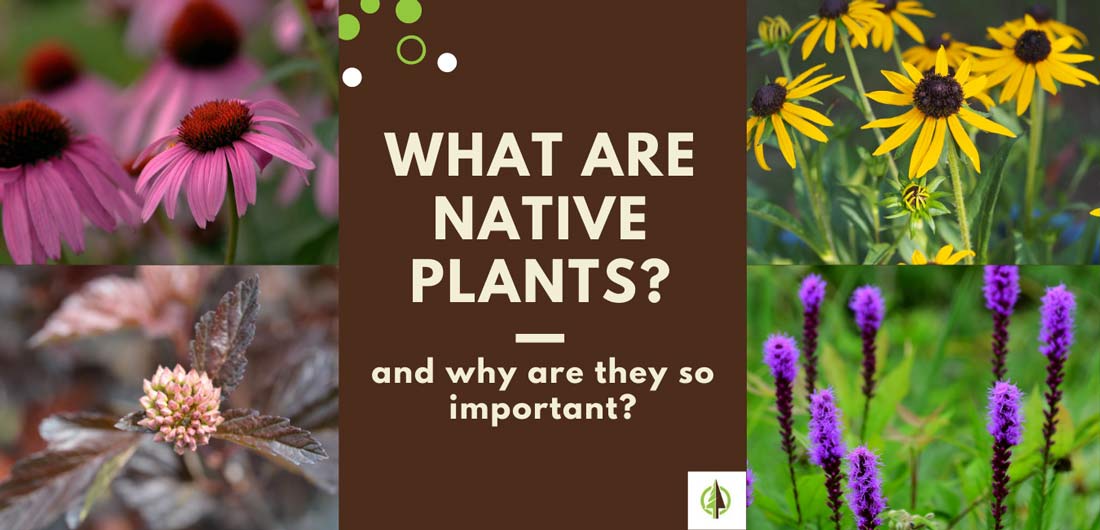What comes to mind when you think of ‘native plants’? Overgrown, messy-looking flowers that kind of look like weeds? While some native plantings do indeed look wild, that is not the case for most. There are many beautiful choices that help to support our environment and our shorelines.
With shoreline erosion becoming more and more prevalent in Northern Michigan, the buzz around native plants has grown. It is extremely important for our shorelines and our environment in general that we all have a good understanding of native plants and how they impact our area.
What does ‘native plant’ mean?
The word native, when referring to plants, is defined as of indigenous origin or growth. Native plants are not introduced into the environment by humankind and there is no direct or indirect human intervention to help the plant survive. They have evolved, adapted, and survived in a specific area. Native plants to the Northern Michigan area are catered to last through our tough winters, grow deep roots to help stabilize our shorelines, and allow for pollination to occur to support our environment. They don’t negatively impact soils or wildlife.
Native plantings are not only wildflowers. Shrubs, trees, grasses, and ground covers all have native varieties that can be added to your landscape. Some of our favorite native plantings are Black Eyed Susans, Bee Balm, Sunflowers, Serviceberry, Switch Grass, and Dogwood.
Why are native plants so important?
Simply put, native plants help support and provide a habitat to support our native wildlife.
One great example is the endangered Karner blue butterfly caterpillars that can only feed on wild lupine plants. Karner blue butterflies will not lay their eggs on any other plant, leaving them dependent on native plants for their survival. Native plants help with erosion and slow runoff as well.
5 Reasons Why Native Plantings are a Good Idea for Your Space
- When planted in a well-matched area, they need little care once they are established (i.e. water, fertilizer, pesticide applications).
- Many native plants attract pollinators and other helpful insects. Some of these insects feed on those who eat our plants and crops.
- There is a ton of variety, colors, and choices. Native plants are beautiful!
- Native plants help with erosion, enrich the soil, and slow runoff.
- Native plants support the surrounding environment and habitat.
Are all ‘non-native’ plants bad?
No, some plants that are not native are just fine. We recommend planting them further away from the shoreline though. Typically, their root systems do not hold as well, and sometimes permitting requires only native plantings near shorelines.
There are invasive species though that can be very harmful to the environment. Invasive species are non-native to the ecosystem and whose introduction is likely to cause environmental harm. Invasive plants have aggressive root systems that spread and choke out any surrounding vegetation and thrive in disturbed soils. Some of them produce chemicals in their leaves and roots which inhibit the growth of other plants around them. The danger is they are distributed by birds, wind, and humans—leading to their invasive nature.
Adding Native Plantings to Your Outdoor Area
Choosing native plantings when possible is extremely important to sustain our environment, especially in Northern Michigan. When selecting a landscape contractor, we recommend asking them about native and invasive plantings. While making beautiful landscapes is important, so is being a steward of our area.
We belong to the Northwest Michigan Invasive Species Network’s ‘Go Beyond Beauty’ program. This program requires participants to commit to not using or selling invasive species to their clients.
Ready to get started on your landscaping project using native plantings in Grand Traverse or Leelanau County, MI? If so, meet with our team of experts, choose a solution to improve your property, and get ready to sit back, relax, and enjoy your beautiful outdoor space.
Image Sources: Root Depth Comparision, Natives vs. Non Natives
Get started today with a consultation!
Want tips and tricks for your lawn & landscaping?
Sign Up For Our Free Quarterly Newsletter
We take your personal information very seriously. We will not share any of the information you provide with any 3rd parties. Provided information will be used specifically to contact you in regards to your inquiry.

